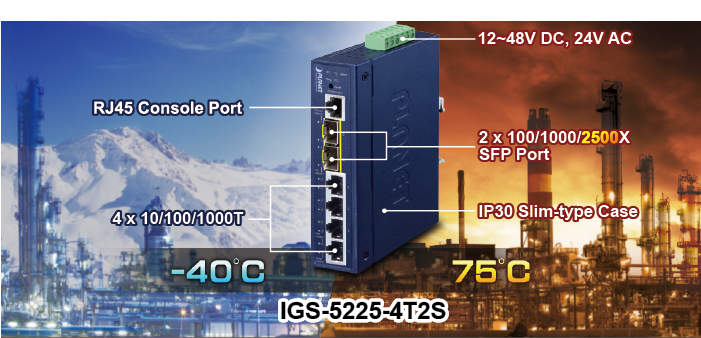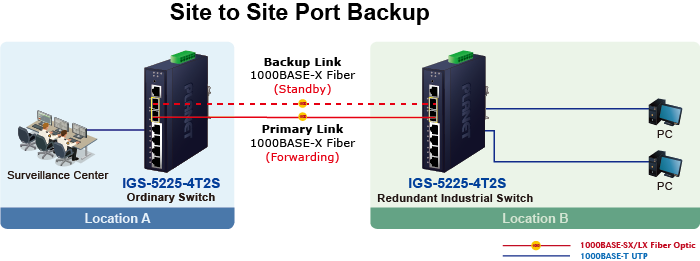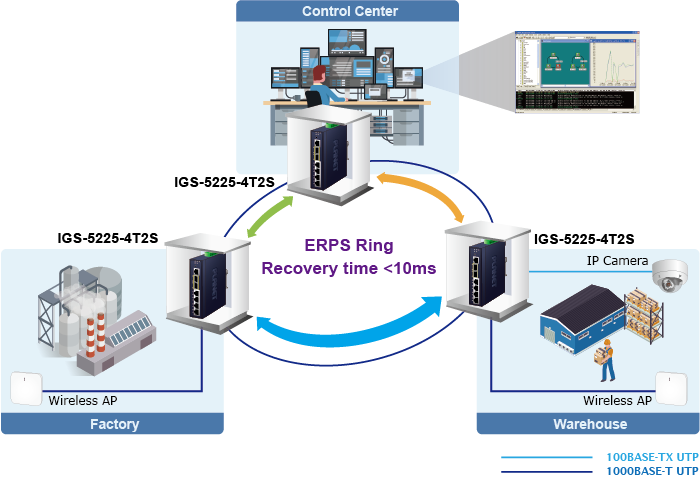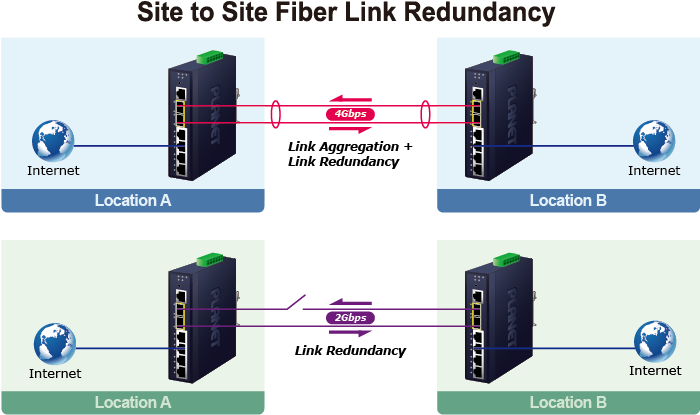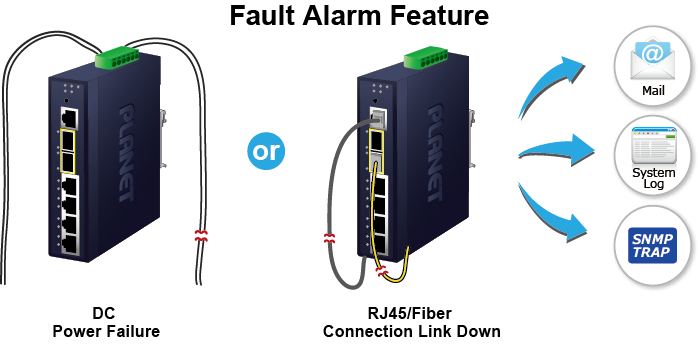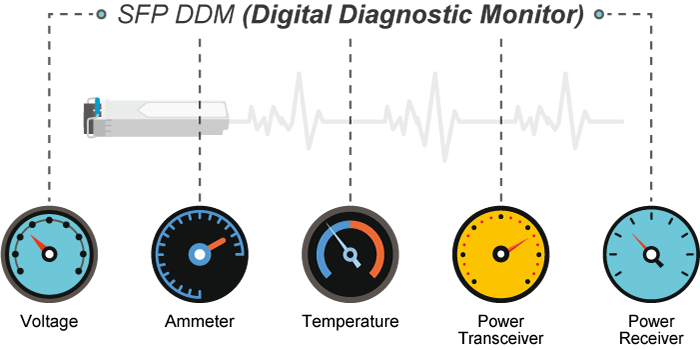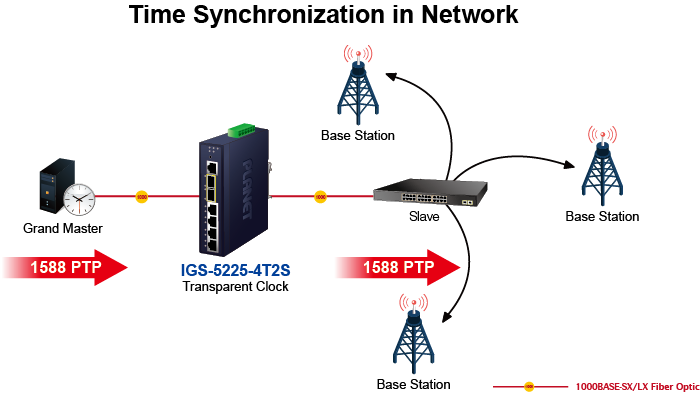PLANET L2+ Industrial 4-Port 10/100/1000T + 2-Port 1G/2.5G SFP Managed Ethernet Switch
- ΔΙΑΘΕΣΙΜΟΤΗΤΑ: In Stock
- Κωδικός Προϊόντος: IGS-5225-4T2S
- UPC: PLA-00406
- EAN: 4711605282406
| Hardware Specifications | |
| Copper Ports | 4 10/100/1000BASE-T RJ45 auto-MDI/MDI-X ports |
| SFP/mini-GBIC Slots | 2 1000/2500BASE-SX/LX/BX SFP interfaces (Port-5 to Port-6) Compatible with 100BASE-FX SFP |
| Console | 1 x RJ45-to-RS232 serial port (115200, 8, N, 1) |
| Reset Button | < 5 sec: System reboot > 5 sec: Factory default |
| ESD Protection | Air 8KV, Contact 6KV |
| Enclosure | IP30 metal case |
| Installation | DIN-rail kit and wall-mount kit |
| Connector | Removable 6-pin terminal block for power input Pin 1/2 for Power 1, Pin 3/4 for fault alarm, Pin 5/6 for Power 2 |
| Alarm | One relay output for power failure. Alarm relay current carry ability: 1A @ 24V DC |
| LED Indicator | System: Power 1 (Green) Power 2 (Green) Fault Alarm (Red:) Ring (Green) Ring Owner (Green) Per 10/100/1000T RJ45 Ports: 10/100Mbps LNK/ACT (Amber) 1000 LNK/ACT (Green) Per SFP Interface: 100 LNK/ACT (Amber) 1000/2500 LNK/ACT (Green) |
| Dimensions (W x D x H) | 32 x 87x 135 mm |
| Weight | 442g |
| Power Requirements | Dual 12~48V DC 24V AC |
| Power Consumption | Max. 4.8 watts/16.4 BTU (Power on without any connection) Max. 8.5 watts/29.2 BTU (Full loading) |
| Switching Specifications | |
| Switch Architecture | Store-and-Forward |
| Switch Fabric | 18Gbps/non-blocking |
| Throughput (packet per second) | 13.39Mpps@ 64 bytes packet |
| Address Table | 8K entries, automatic source address learning and aging |
| Shared Data Buffer | 4Mbits |
| Flow Control | IEEE 802.3x pause frame for full duplex Back pressure for half duplex |
| Jumbo Frame | 9Kbytes |
| Layer 3 Function | |
| IP Interface | Max. 8 VLAN interfaces |
| Routing Table | Max. 32 routing entries |
| Routing Protocols | IPv4 software static routing IPv6 software static routing |
| Layer 2 Function | |
| Port Configuration | Port disable/enable Auto-negotiation 10/100/1000Mbps full and half duplex mode selection Flow control disable/enable Power saving mode control |
| Port Status | Display each port’s speed duplex mode, link status, flow control status, auto negotiation status, trunk status |
| Port Mirroring | TX/RX/both Many to 1 monitor Rmirror – Remote Switch Port Analyzer (Cisco RSPAN) |
| VLAN | IEEE 802.1Q tag-based VLAN IEEE 802.1ad Q-in-Q tunneling Private VLAN Edge (PVE) MAC-based VLAN Protocol-based VLAN VLAN Translation Voice VLAN MVR (Multicast VLAN Registration) GVRP Up to 4K VLAN groups, out of 4094 VLAN IDs |
| Spanning Tree Protocol | IEEE 802.1D Spanning Tree Protocol IEEE 802.1w Rapid Spanning Tree Protocol IEEE 802.1s Multiple Spanning Tree Protocol |
| Link Aggregation | IEEE 802.3ad LACP/static trunk Supports 4 trunk groups with 4 ports per trunk group |
| IGMP Snooping | IPv4 IGMP (v1/v2/v3) snooping IPv4 IGMP querier mode support Up to 255 multicast groups |
| MLD Snooping | IPv6 MLD (v1/v2) snooping IPv6 MLD querier mode support Up to 255 multicast groups |
| Bandwidth Control | Per port bandwidth control Ingress: 500Kb~1000Mbps Egress: 500Kb~1000Mbps |
| RING | Supports ERPS, and complies with ITU-T G.8032 Recovery time < 10ms @ 3 units Recovery time < 50ms @16 units |
| Synchronization | IEEE 1588v2 PTP(Precision Time Protocol) Peer-to-peer transparent clock End-to-end transparent clock |
| QoS | Traffic classification based, strict priority and WRR 8-level priority for switching Port number 802.1p priority 802.1Q VLAN tag DSCP/TOS field in IP packet |
| Security Functions | |
| Access Control List | IP-based ACL/MAC-based ACL ACL based on: MAC Address IP Address Ethertype Protocol Type VLAN ID DSCP 802.1p Priority Up to 256 entries |
| Security | Port Security IP source guard Dynamic ARP inspection Command line authority control based on user level |
| AAA | RADIUS client TACACS+ client |
| Network Access Control | IEEE 802.1x port-based network access control MAC-based authentication Local/RADIUS authentication |
| Switch Management | |
| Basic Management Interfaces | Console interface; Telnet; Web browser; SNMP v1, v2c |
| Secure Management Interfaces | SSHv2, TLS v1.2, SNMP v3 |
| System Management | Firmware upgrade by HTTP protocol through Ethernet network Configuration upload/download through HTTP Remote syslog System log LLDP protocol NTP PLANET Smart Discovery Utility PLANET CloudViewer app |
| Event Management | Remote syslog Local system log SMTP |
| SNMP MIBs | RFC 1213 MIB-II RFC 2863 IF-MIB RFC 1493 Bridge MIB RFC 1643 Ethernet MIB RFC 2863 Interface MIB RFC 2665 Ether-Like MIB RFC 2737 Entity MIB RFC 2819 RMON MIB (Groups 1, 2, 3 and 9) RFC 2618 RADIUS Client MIB RFC 3411 SNMP-Frameworks-MIB IEEE 802.1X PAE LLDP MAU-MIB |
| Standards Conformance | |
| Regulatory Compliance | FCC Part 15 Class A, CE |
| Stability Testing | IEC60068-2-32 (free fall) IEC60068-2-27 (shock) IEC60068-2-6 (vibration) |
| Standards Compliance | IEEE 802.3 10BASE-T IEEE 802.3u 100BASE-TX/100BASE-FX IEEE 802.3z Gigabit SX/LX IEEE 802.3ab Gigabit 1000T IEEE 802.3x flow control and back pressure IEEE 802.3ad port trunk with LACP IEEE 802.1D Spanning Tree Protocol IEEE 802.1w Rapid Spanning Tree Protocol IEEE 802.1s Multiple Spanning Tree Protocol IEEE 802.1p Class of Service IEEE 802.1Q VLAN tagging IEEE 802.1ad Q-in-Q VLAN stacking IEEE 802.1X Port Authentication Network Control IEEE 802.1ab LLDP IEEE 802.3ah OAM IEEE 1588 PTPv2 RFC 768 UDP RFC 793 TFTP RFC 791 IP RFC 792 ICMP RFC 2068 HTTP RFC 1112 IGMP v1 RFC 2236 IGMP v2 RFC 3376 IGMP version 3 RFC 2710 MLD version 1 RFC 3810 MLD version 2 ITU-T G.8032 ERPS Ring |
| Environment | |
| Operating Temperature | -40 ~ 75 degrees C |
| Storage Temperature | -40 ~ 85 degrees C |
| Humidity | 5 ~ 95% (non-condensing) |




